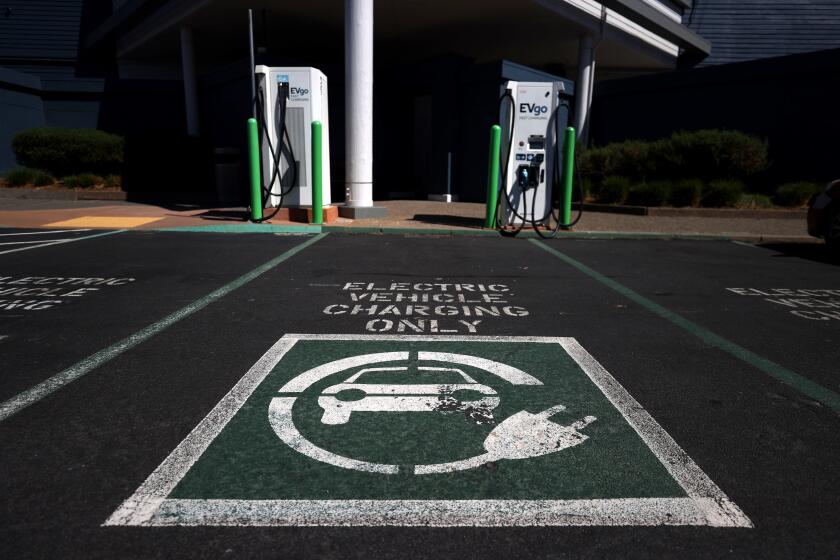Pileup foreseen if Big 3 crash
Ford Motor Co.’s F-150 pickup is the top-selling vehicle in America with more than 436,000 purchased through October. But when people stop buying the F-150 -- and 26% fewer have been sold this year than last -- it’s not just Ford and its workers that suffer.
Falling sales dry up orders for antifreeze made in Illinois by a division of Honeywell International Inc., computer sensors manufactured by Germany’s Robert Bosch Gmbh in South Carolina and a hood latch part made by the 110 or so employees of Amanda Bent Bolt Co. of Logan, Ohio.
All told, each truck contains 4,350 parts, made by 270 suppliers in 26 states as well as several foreign countries. Every F-150 that doesn’t sell hits literally hundreds of thousands of people who play a role in putting the big machine on the road.
When it comes to the U.S. automakers and their financial troubles, politicians and the public tend to think about the 240,000 jobs that could be lost at the Big Three’s assembly lines in Michigan and nearby Rust Belt states.
Yet suppliers provide about 70% of the content in most automobiles, from the seats to specialized bolts on the suspension -- everything except the sheet metal and the motor assembly. So when Ford, Chrysler or General Motors Corp. sneeze, 600,000 workers in places as widely scattered as Peachtree City, Ga., and Pittsburg, Kan., are likely to catch cold.
As the Alliance of Automobile Manufacturers trade group likes to say, “A lot of U.S. industry goes into every automobile.”
That delicate but often overlooked relationship is of crucial importance now that Congress is preparing to debate at least $25 billion in new aid to the auto industry. The U.S. automakers have appealed to the Bush administration and President-elect Barack Obama for help, arguing that huge losses and crashing sales make emergency cash a necessity.
GM and Ford have lost a combined $30 billion this year, while U.S. sales by all three carmakers have declined 21%. This month, GM said it might not have enough cash to pay its bills in the first half of next year.
Senate Majority Leader Harry Reid (D-Nev.) plans to try to bring up an auto industry rescue bill today, the first day of the lame-duck session. A vote could occur Wednesday, but it will be difficult to overcome a threatened filibuster, which would put the issue off until Obama takes office in January with bigger Democratic majorities in Congress.
A number of Republicans who came under attack for supporting the $700-billion Wall Street bailout have been hesitant to back new aid to the auto industry. Sen. John Cornyn (R-Texas), who backed the banking system cash, said: “Like most Americans who are concerned about the direction of our economy and more federal spending, I must also ask: When is enough enough?”
What Congress decides could have serious effects on not just employees of Ford, GM and Chrysler but also those who work at such companies as Superior Industries International of Van Nuys, which makes the F-150’s wheels. Superior will close its Pittsburg aluminum wheel plant next month, laying off about 600 employees, because its shipments in the third quarter dropped to the lowest level in a decade.
In Peachtree City, Panasonic Automotive Systems Co. of America has notified its approximately 500 employees who make car stereos, GPS devices and rear-seat DVD entertainment systems that they’ll be out of work by the end of next year.
It’s a similar story at AK Steel Corp., which relies on the auto market for 30% of its business. The company has temporarily shut down its Mansfield, Ohio, plant because of low demand for the stainless steel it produces for exhaust systems.
“This industry has just nose-dived,” said Neil DeKoker, chief executive of the trade group Original Equipment Suppliers Assn. He estimates that among the roughly 5,000 U.S. suppliers, more than 100,000 jobs have been shed in the last two years as carmakers order increasingly fewer parts. According to a study by advisory firm BBK, 17% of suppliers were at risk of bankruptcy at the outset of 2008, and the study’s author believes that figure has risen significantly this year.
The vast majority of suppliers get 60% or more of their orders from the auto industry, making the companies particularly vulnerable to a downturn in demand for cars. Detroit’s routine requests for lower prices on parts only compound the problem, DeKoker said. “This could be the last breath for some of these suppliers. Some are just not going to make it.”
The Big Three spend about $300 billion a year on equipment, supplies, tooling and parts ranging from transmissions to shop rags. In the U.S. alone, Ford spends more than $40 billion.
GM spends $7 billion a year transporting parts to factories and hauling automobiles to dealers. That makes railroads and trucking firms huge clients of the Big Three. No wonder that with car sales down, Norfolk Southern Corp. reported a 30% decline in rail car business in the third quarter compared with a year earlier.
Vehicle and parts manufacturing jobs are concentrated in the Midwest and the South. Collectively, Michigan, Ohio, Indiana, Tennessee and Illinois have more than half the industry’s jobs. Other states with sizable numbers include Kentucky, New York, California, Pennsylvania and North Carolina, according to the Bureau of Labor Statistics.
With such a wide base of suppliers, the effects of a big automaker failure could be felt throughout the country. “Suppliers have already been in a recession for several years now,” said William Diehl, chief executive of BBK. He pointed out that many of the problems that have afflicted Ford, GM and Chrysler -- high gas prices, frozen credit markets and plummeting consumer confidence -- affect suppliers as well.
With up to 50% of suppliers “distressed” because of lack of access to new sources of financing and decreased sales, Diehl predicts a “huge increase in supplier liquidations and bankruptcy filings very soon.”
That would create blow-back for automakers. In February, Plastech Engineered Products Inc. filed for bankruptcy protection. The Dearborn, Mich., molded plastic parts maker employed 7,600 people and had plants in eight states. Last year, it sold $1.4 billion worth of engine covers, grill panels, floor consoles and the like to carmakers, including $200 million in parts to Chrysler. When Plastech closed up shop, Chrysler was forced to immediately idle four plants, sending 10,500 employees home until the automaker could find a new supplier.
Most large suppliers sell parts to all three American automakers, plus European and Asian companies such as Toyota Motor Corp. that have plants in the U.S. So the failure of certain suppliers could cut off production beyond the Big Three.
“There are dozens and dozens of tiny suppliers that, if they fail, could shut down GM, Ford or even Honda,” said Craig Fitzgerald of accounting and advisory firm Plante Moran. That possibility was highlighted in a recent report by the Center for Automotive Research, which predicted that the failure of a major carmaker could set off a spiraling chain of failures claiming 2.5 million jobs within a year.
Long the silent partners in the automotive world, suppliers are beginning to make noise to draw attention to their financial straits.
“Our national security is at stake,” Tim Leuliette, chief executive of Dura Automotive Systems, wrote in a letter to President Bush and Treasury Secretary Henry M. Paulson on Thursday, urging government aid for GM, Ford and Chrysler.
Today, the industry’s two largest trade groups are expected to send a letter to Congress, signed by nearly 100 companies, supporting federal help to automakers -- but urging that the money be spread around.
“Aid is necessary, but it should be provided for suppliers also,” said Ann Wilson, senior vice president for government affairs at the Motor and Equipment Manufacturers Assn.
Even with significant help from Washington, some worry that depressed sales of vehicles will continue to push suppliers out of business.
“These companies are in a position where they can’t take any more hits,” said Kimberly Rodriguez, a principal in the automotive practice at consulting firm Grant Thornton. “A government bailout doesn’t affect sales, and sales is what this industry needs.”
--
richard.simon@latimes.com




